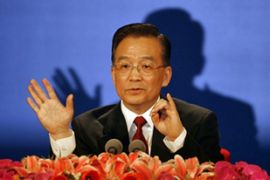China passes property and tax laws
Laws aimed at protecting private property and stimulating growth, says premier.

Critics have strongly opposed the property law, which was delayed for 14 years, saying it threatened the government’s guiding role and would lead to a wider income gap.
Equal rates
Under the new tax law, foreign-financed companies and Chinese enterprises will pay the same rate of 25 per cent, ending complaints about unequal treatment.
China created special economic and technology zones with low taxes to attract nearly $700 bn in foreign investment which has fuelled its meteoric growth to become the world’s fourth-largest economy.
The private sector, including foreign investment, has grown to account for 65 per cent of gross national product and up to 70 per cent of tax revenues.
 |
| The formation of the new property law has been delayed for 14 years [AFP] |
Wen also said that the quality of public-listed Chinese companies should be improved through enhanced supervision.
He said an “open, fair and transparent” market and oversight mechanism should be instituted because “our goal is to build a mature capital market”.
“We also need to encourage and do a good job in the timely disclosure of information in the stock market,” he added.
Stronger stocks
Two weeks ago, the Chinese market plunged and triggered a global sell-off, dragging down bourses in New York, Hong Kong, London and elsewhere.
China‘s stock markets have grown rapidly in recent years but are subject to wild swings in prices and accusations of insider trading and other systemic abuses.
Wen said a new investment arm created to handle some of China‘s $1 trillion in foreign exchange reserves will not affect holdings of US dollar-denominated assets.
“It is true that in China‘s foreign exchange reserves, US dollar-denominated assets account for a large proportion,” he said.
“I can assure you that by instituting such a foreign exchange company, it will not have an impact on the US dollar-denominated assets.”
China is believed to keep as much as 70 per cent of its reserves in US Treasury bills and other dollar-denominated assets.